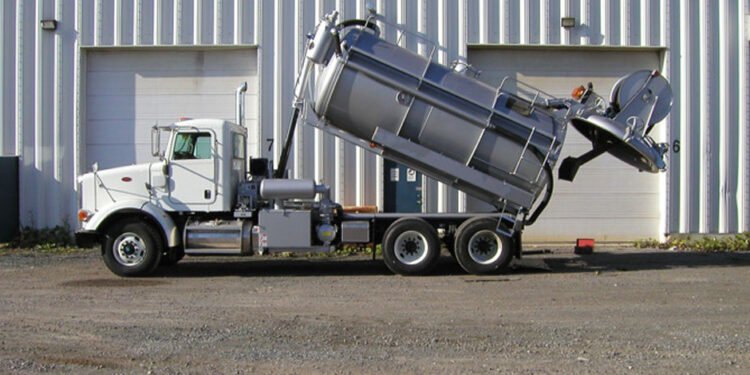Investing in a vacuum truck can be a significant business decision, especially if you’re considering purchasing a used model. A vacuum truck, also known as a vac truck, plays a vital role in various industries, including waste management, construction, and oil and gas. These trucks offer a powerful solution for cleaning up waste, liquids, sludge, and hazardous materials, ensuring a cleaner and safer environment.
However, buying a used vacuum truck requires careful thought and research to ensure you’re getting a good deal and a vehicle that can meet your business needs. Below, we’ll explore the top considerations when buying a used vacuum truck, from assessing the truck’s condition to understanding maintenance records and more.
Understand Your Specific Needs
Before you start looking at used vacuum trucks, it’s crucial to understand your specific business needs. Vacuum trucks come in various types, each designed for different functions. Some vacuum trucks are more suited for industrial applications, while others are designed for septic services, hydro excavation, or hazardous material handling.
Here are some questions to ask yourself:
- What type of materials will you be handling? (e.g., liquids, solids, hazardous waste)
- How often will the truck be in use?
- What kind of job sites will you be working at? (urban environments, construction sites, etc.)
- Do you need a truck that can handle hazardous waste, or will a basic vacuum truck suffice?
By understanding your exact requirements, you can narrow down the type of vacuum truck that will best suit your business operations, saving you time and money in the long run.
Inspect the Condition of the Vacuum System
The vacuum system is the heart of any vacuum truck, so you’ll want to inspect it closely. This system is responsible for creating suction to collect materials, making it essential to the truck’s functionality. When evaluating a used vacuum truck, pay close attention to the following components of the vacuum system:
- Vacuum Pump: Check the condition of the vacuum pump. Is it operating smoothly without unusual noises? A worn-out or malfunctioning vacuum pump can lead to inefficient performance and costly repairs down the line.
- Hoses and Seals: Ensure that all hoses and seals are intact and free of leaks. A small crack or hole can severely impact suction power, making the truck less effective at completing its tasks.
- Tank Condition: Inspect the tank for signs of wear and tear. Corrosion or damage to the tank could indicate that the truck has been used extensively in harsh conditions or may need repairs.
A used vacuum truck with a well-maintained vacuum system can save you money by ensuring efficient operation and reducing the need for early replacements or repairs.
Review Maintenance and Service Records
One of the most critical factors when buying a used vacuum truck is its maintenance and service history. Well-documented maintenance records can provide valuable insights into how well the truck has been cared for. It’s important to review records for:
- Regular Oil Changes: Routine oil changes can indicate that the truck’s engine and other moving parts have been properly lubricated, prolonging their lifespan.
- Scheduled Maintenance: Regularly scheduled maintenance, such as brake checks, tire rotations, and vacuum pump servicing, is a good sign that the previous owner took care of the vehicle.
- Repairs and Part Replacements: Review records for any major repairs or part replacements. If key components like the engine, vacuum pump, or hydraulic systems have been replaced, this could indicate potential issues or that the truck has been well-maintained to prolong its service life.
Evaluate the Engine and Transmission
The engine and transmission are the driving forces behind any vehicle, and vacuum trucks are no exception. When buying a used vacuum truck, you’ll want to ensure the engine and transmission are in good working order. Consider the following:
- Engine Health: Look for signs of oil leaks, unusual noises, or excessive smoke from the exhaust. These could indicate engine issues that may require expensive repairs.
- Transmission Smoothness: Take the truck for a test drive to assess how smoothly the transmission shifts. A rough or noisy transmission could be a sign of wear or damage.
- Mileage and Engine Hours: Low mileage and engine hours often indicate less wear and tear, but this isn’t always the case. Be sure to compare the engine hours with the mileage to determine how hard the truck has worked. Vacuum trucks with high engine hours but low mileage may have been used extensively for vacuum operations while stationary.
Inspect the Chassis and Suspension
The chassis and suspension of a vacuum truck take a beating, especially in industrial or construction environments. A thorough inspection of these components is crucial to ensure the truck can handle future work without issues. Here’s what to look for:
- Frame Condition: Check for any signs of rust or damage on the truck’s frame. Rust, especially on key structural components, can weaken the vehicle and pose safety risks.
- Suspension Components: Inspect the truck’s suspension system for any signs of wear, such as leaking shock absorbers or sagging springs. A damaged suspension can affect the truck’s handling and load capacity, leading to safety concerns.
A well-maintained chassis and suspension are key to the longevity and reliability of a vacuum truck, particularly in rough working environments.
Consider the Truck’s Age and Depreciation
While buying a used vacuum truck can save you money upfront, it’s important to consider the truck’s age and the effects of depreciation. As with any vehicle, vacuum trucks depreciate over time, and older models may come with a lower price tag but potentially higher maintenance costs.
When evaluating the age of the truck:
- Compare the age to the number of engine hours: An older truck with low engine hours may be a better buy than a newer truck with excessive engine hours.
- Consider technological advancements: Newer vacuum trucks often come with advanced features such as better fuel efficiency or improved safety systems. If these features are important to you, opting for a slightly newer used truck might be a worthwhile investment.
Assess the Tires and Brakes
The condition of the tires and brakes is another crucial factor when buying a used vacuum truck. Worn-out tires or brakes can lead to safety hazards and added costs shortly after purchase. Here’s what to check:
- Tire Tread Depth: Ensure the tires have sufficient tread left. Bald tires will need replacing soon, which can be costly, especially for heavy-duty vehicles like vacuum trucks.
- Brake Pads and Rotors: Inspect the brake pads and rotors for signs of excessive wear. Poor brakes not only jeopardize safety but can also result in costly repairs if ignored for too long.
Check for Proper Documentation and Title
Before finalizing the purchase of a used vacuum truck, it’s essential to verify that the vehicle comes with proper documentation. Ensure the seller provides a clear title indicating legal ownership of the truck. Additionally, check for any outstanding liens on the truck, as this could complicate the purchase process.
Make sure the truck also comes with proper registration and emissions certifications, if applicable. Having all the necessary documentation in order can help you avoid legal headaches and ensure a smooth transfer of ownership.
Assess the Truck’s Fuel Efficiency
Vacuum trucks are known for consuming large amounts of fuel, so fuel efficiency is an important factor, especially if the truck will be used frequently. Ask the seller for records of the truck’s fuel economy and consider how much it will cost to operate the vehicle over time. Opting for a truck with better fuel efficiency may save you significant money in the long run, especially with fluctuating fuel prices.
Consider Warranty Options
Lastly, when purchasing a used vacuum truck, it’s wise to inquire about any available warranties or extended service contracts. While many used trucks are sold “as is,” some dealers or private sellers may offer limited warranties on certain components, such as the engine or vacuum system.
An extended warranty can provide peace of mind and potentially save you thousands of dollars in repair costs should any issues arise after purchase.
Final Thoughts
Buying a used vacuum truck can be a smart investment if you approach the process carefully. By thoroughly inspecting the vehicle’s condition, reviewing maintenance records, and considering your specific business needs, you can find a reliable truck that will serve your operations well for years to come.
Remember, the key to getting the best deal is to take your time, conduct proper research, and work with reputable sellers. A well-maintained vacuum truck will ensure you can perform jobs efficiently and cost-effectively, making it a worthwhile addition to your fleet.












